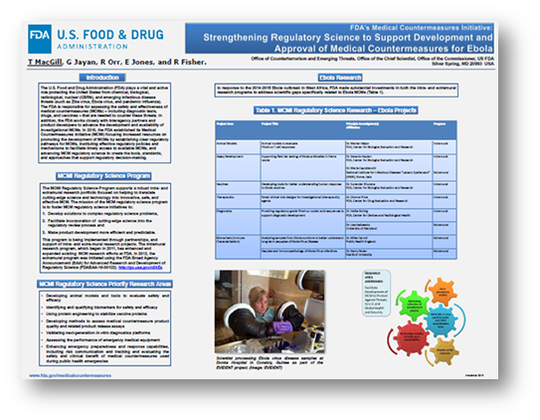
December 19, 2016 | FDA Medical Countermeasures Initiative Update

Regulatory science supports MCM development
The FDA Medical Countermeasures Initiative (MCMi) Regulatory Science program supports a robust research portfolio focused on helping to translate cutting-edge science and technology into innovative, safe, and effective medical countermeasures (MCMs).
Learn more about how FDA research is supporting development of MCMs for Ebola in this poster (PDF, 526 KB), presented by FDA scientist CDR Tracy MacGill, PhD, at the Hemorrhagic Fever Viruses conference in Santa Fe, NM in December 2016.
Related Information
- Challenges in the Development of Medical Countermeasures (PDF, 219 KB) - slides presented at The Biology of Anthrax Conference in Tampa, FL in November 2016
- MCMi extramural research funding and projects
- MCMi intramural research projects
- Ebola response updates from FDA

Studying how pathogens cause disease
An FDA CDER Conversation with Daniela Verthelyi, Chief, Laboratory of Immunology, Office of Biotechnology Products, Office of Pharmaceutical Quality, CDER
In order to effectively regulate products that diagnose, treat or prevent infectious diseases, scientists and reviewers in the Center for Drug Evaluation and Research (CDER) must understand the bacteria, viruses, and parasites that cause diseases. Scientists in CDER conduct many programs to advance regulatory science and research on pathogens -- agents that cause infection or disease. More
|  |

EUA Updates
New EUAs:
EUA Amendments:
More information about these EUAs and amendments is available on the FDA Zika virus response updates page. Also see the latest CDC Zika Laboratory Guidance, implemented in November 2016.
|  |

Guidance and information for industry
- FDA is requesting that any industry organizations interested in participating in the selection of a nonvoting industry representative to serve on the Blood Products Advisory Committee for the Center for Biologics Evaluation and Research (CBER) notify FDA in writing. FDA is also requesting nominations for a nonvoting industry representative(s) to serve on the Blood Products Advisory Committee. Send letter of interest and/or nomination materials to FDA by December 23, 2016.
- CDER is announcing the 2017 CDER Office of Pharmaceutical Quality (OPQ) Staff Experiential Learning Site Visit Program. Pharmaceutical companies interested in participating in this program should submit a site visit proposal by January 17, 2017.
- Draft guidance for industry - Submission of Quality Metrics Data (PDF, 340 KB) - Comment by January 24, 2017. (November 25, 2016)
- Guidance for industry - Contract Manufacturing Arrangements for Drugs: Quality Agreements (PDF, 123 KB) (November 22, 2016)
- Guidance - Drug Supply Chain Security Act Implementation: Identification of Suspect Product and Notification (PDF, 146 KB) - The guidance is intended to aid certain trading partners in identifying a suspect product and specific scenarios that could significantly increase the risk of a suspect product entering the pharmaceutical distribution supply chain. This guidance includes a new section, for comment purposes only, that describes when manufacturers should notify FDA of a high risk that a product is illegitimate. Submit comments on this draft section by February 7, 2017. (December 9, 2016)

Events
- New! January 9, 2017: The HHS National Advisory Committee on Children and Disasters and the National Preparedness and Response Science Board will hold a joint public meeting via teleconference from 2:00 - 3:00 p.m. ET
- New! January 11, 2017: HHS ASPR TRACIE Webinar - Learning More About the 2017-2022 Health Care Preparedness and Response Capabilities (PDF, 795 KB), 2:30 - 3:30 p.m. ET
- February 2, 2017: Ninth Annual Sentinel Initiative Public Workshop (Washington, DC and webcast) - register before February 2, 2017 (there will be no on-site registration)
- New! February 6-8, 2017: ASM Biothreats Research, Response and Policy (Washington, DC) (fee)
- New! February 6-9, 2017: USDA ARS 4th International Biosafety & Biocontainment Symposium : Global Biorisk Challenges - Agriculture and Beyond (Baltimore, MD) (fee)
- New! February 8, 2017: Multi-Agency Informational Meeting Concerning Compliance With the Federal Select Agent Program (webcast), hosted by CDC and USDA (rescheduled from November 2016) - register by February 6, 2017

In case you missed it
- Emergency Legal Preparedness and FDA Response to Zika Virus (PDF, 1.4 MB), presented by Brooke Courtney, JD, MPH, at the American Bar Association Washington Health Summit in December 2016.
- The HHS Secretary has amended two Public Readiness and Emergency Preparedness (PREP) Act declarations, continuing PREP Act coverage for Ebola virus disease vaccines and therapeutics. This is the second amendment to the February 27, 2015, Declaration. Also see PREP Act FAQs. (December 12, 2016)
- FDA prevented 142 drug shortages in 2015. View the updated drug shortages infographic - more about drug shortages (December 12, 2016)
 |
- The HHS Assistant Secretary for Preparedness and Response (ASPR) is celebrating 10 years of protecting disaster health, saving lives, and improving health security.(December 2016)
- FDA released its 2014 National Antimicrobial Resistance Monitoring System (NARMS) Integrated Report, highlighting antimicrobial resistance patterns in bacteria isolated from humans, retail meats, and animals at slaughter. Specifically, the report focuses on major foodborne bacteria that are resistant to antibiotics that are considered important to human medicine, and on multidrug resistant organisms (described as resistant to three or more classes of antibiotics). (November 18, 2016)
- FDA is extending the comment period to continue seeking public input on establishing appropriately targeted durations of therapeutic use of medically important antimicrobial drugs in food-producing animals. The comment period will now close on March 13, 2017.
- U.S. Secretary of Commerce Penny Pritzker announced the first Department of Commerce Institute from an ‘open topic’ competition: the National Institute for Innovation in Manufacturing Biopharmaceuticals (NIIMBL). Unlike traditional drugs made using chemistry, biopharmaceuticals are made with living cells—a more complex manufacturing environment. The institute will help ensure that the nation can rapidly scale up manufacture of these advanced treatments to respond to pandemics and other biological threats. (December 16, 2016)





















.jpg)









No hay comentarios:
Publicar un comentario